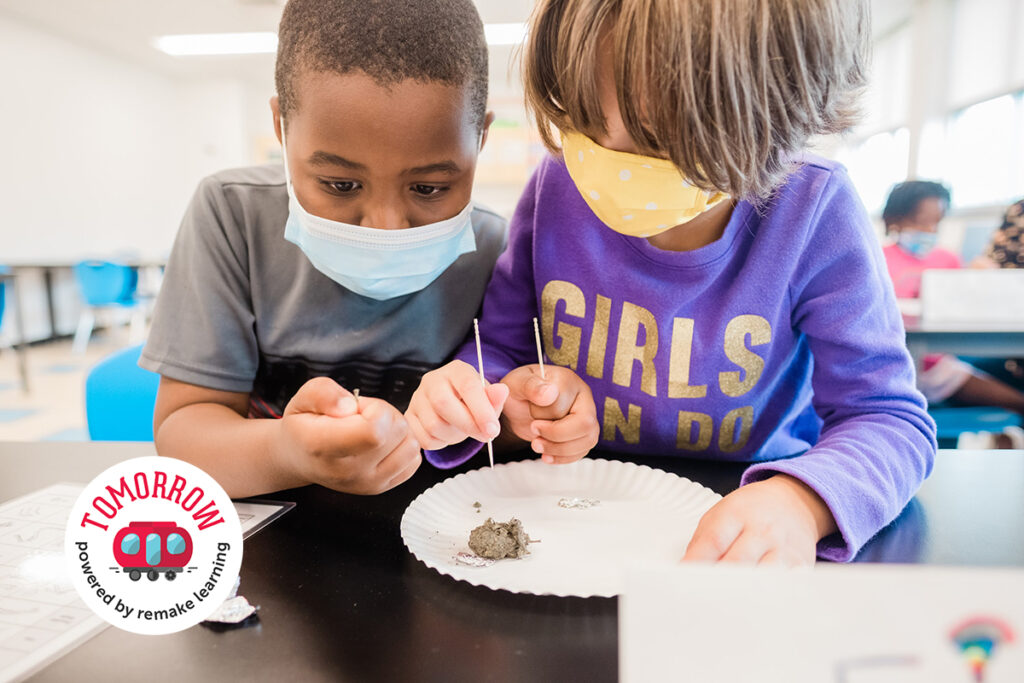What will it take, we wonder, to keep learners and families safe? How might educators — classroom teachers, librarians, childcare workers, and everyone else — meet the needs of students while continuing to care for themselves? And amid so much division and deep, Delta-fueled anxiety, how might parents, neighbors, and communities act as allies in children’s learning?
In times like these — times of concern and excitement, of worry and wonder alike — Fred Rogers had some advice. “The best thing we can do for each other,” he said, “is to listen with our ears and our hearts, and to be assured that our questions are just as important as our answers.”
And so that’s what Remake Learning has been doing: listening. In group sessions and surveys; in talks with almost 200 teachers, parents, out-of-school-time providers, and other partners; in soliciting ideas from nearly a thousand educators across all of Pennsylvania, and in countless conversations with learners, we’ve been wondering, together, about the question on everyone’s minds: What comes next?
The answer, it turns out, is up to us. From school districts to libraries to community arts centers, the innovations we’ve witnessed over the past 18 months have proven that the way things were isn’t the same as the way things have to be. These innovations — designed and led by the creative, caring educators who grace the Pittsburgh region — are pointing the way forward. Wherever we look, we see educators…
Breaking down barriers and building better systems.
Educators are delivering more than just instruction — in many cases, they’re bringing food, devices, and even care packages directly to learners’ homes. Knowing that no one can thrive unless their basic needs are met, schools have broadened the scope of what they provide for students and parents, from hot meals to on-demand help with technology.
In addition to looking outward at communities, educators are also looking inward at themselves. Teacher-led book studies and professional development sessions are helping educators recognize implicit bias; re-examine school curricula; and push for compassionate, inclusive, antiracist schools and districts. It’s a long road ahead, they acknowledge, but it’s no different — and no less critical — than ensuring that learners are fed. Helping every learner thrive means meeting the most basic need there is: the need to be valued, cared for, and safe.
Making learning more engaging, personal, and holistic.
COVID-19 quickly revealed the rigidity — and in some cases, the shortcomings — of our longstanding methods. Knowing that business-as-usual wouldn’t work online, educators reimagined their programs entirely: They created projects that engaged learners at their own pace and in their own communities. They formed community learning hubs where kids could be supported and supervised. And they partnered with people and organizations they’d never worked with before, introducing students to creative professionals, faraway peers, and health and wellness opportunities that transcend the walls of a classroom.
Strengthening the connections that make learning — and learners — more human.
It’s a testament to the area’s educators that despite the pandemic’s disruptions and logistical hiccups and countless urgent demands, they never lost focus on what matters most: relationships. Whether hosting virtual “coffee chats” with parents, making time for daily check-ins with students, or collecting (and acting upon) learners’ feedback, educators built and strengthened connections among parents, communities, learners, and themselves.
These efforts hold limitless promise. And yet we know that so much more remains to be done, particularly here in southwestern Pennsylvania. That’s why today, we’re re-launching Tomorrow, a campaign that calls us to keep wondering — to keep asking what if? and how might? and what’s next?
What if, for example, districts hired “Relationship Directors” who specialized in building a sense of belonging? What if student advisory panels helped schools support every learner?
How might we redesign school schedules and the way we use time, giving learners more flexibility and more options? How might we better support the mental health needs of learners, families, and teachers?
What’s next for social-emotional learning, teacher professional development, and parent and family engagement?
As Fred Rogers reminded us, questions like these are essential. It’s by wondering about them together that we’ll forge a future where each day holds promise for every learner. In the coming months, you can expect to see more stories, more events, and more grants designed to help us leave yesterday behind and put justice, joy, and human potential at the heart of all we do.
What comes next is truly up to us. Let’s #RemakeTomorrow.
Author: Gregg Behr, Co-Chair of Remake Learning
Gregg Behr is executive director of The Grable Foundation and co-chair of Remake Learning. He and Ryan Rydzewski are the co-authors of When You Wonder, You’re Learning: Mister Rogers’ Enduring Lessons for Raising Creative, Curious, Caring Kids. Together, they host the Remaking Tomorrow podcast.
